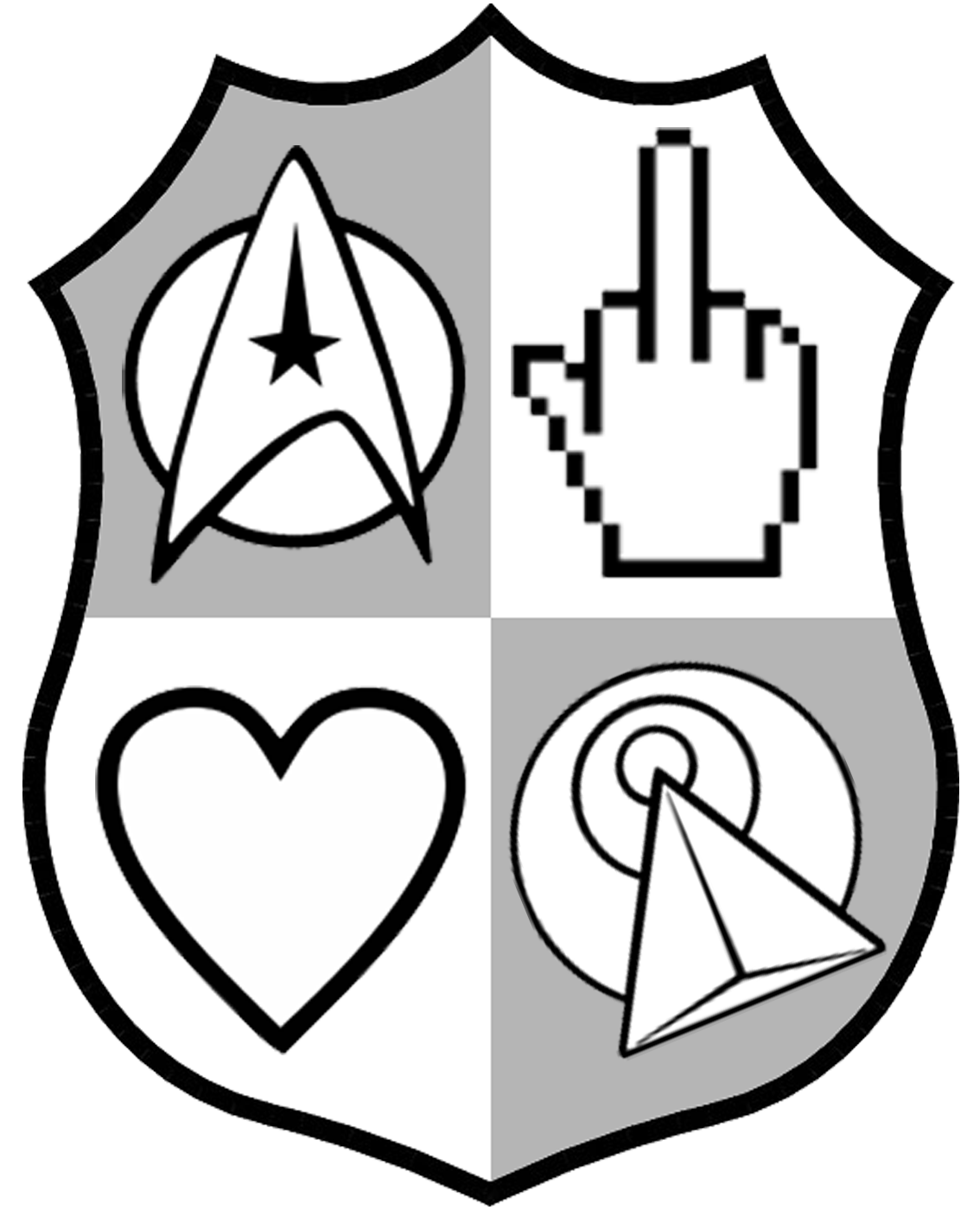Ari
November 23, 2016
Episode 57 – TOS 3×02: “The Enterprise Incident”
So mostly we loved this episode because it contains a novelty for TOS: a take-no-shit female leader in the form of a Romulan Commander whose authority is so unimpeachable that we don’t even get to learn her name.

I mean, there are downsides. We encounter RomCom (we tend to come up with abbreviated nicknames for guest characters and this one was too good not to share) in the course of the Enterprise 100% participating in cross-Neutral-Zone espionage, and she ends up losing the day at least partly due to her having the hots for the tall drink of pointy-eared water that is Commander Spock. There are, of course, counter-arguments to the interpretations of both of those things, and as a bonus, the episode was written by our girl, D.C. Fontana, which lends at least two-thirds of us some confidence that our ultra-progressive headcanoning of this episode are at least a little right.
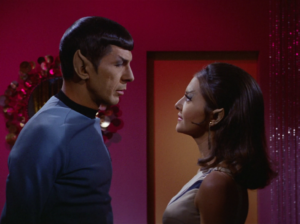
I do have to question the wisdom of Starfleet’s plan here, though, at least at the outset. The plan itself is relatively sound: manufacture a situation in which Starfleet personnel can get onboard a Romunal ship? Fine. Probably you do need to cross into Romulan space to do that. Suggest a possible explanation for this highly illegal action that does not represent a breach of the Federation-Romulan treaty (e.g. Kirk Has Gone Mad Again, something that happens often enough that you’d think people would start to get suspicious)? Cool. I’m with you so far. I’m even with you as far as part C of this plan, i.e. While You’re On Board, See If You Can Get Your Hands On Some Cloaking Tech, which I look on as a sort of value-added bonus-level option.
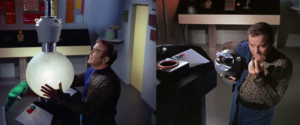
My objection arises in the initial planning stages, in that surely there were easier ways to go about acquiring this intelligence. Doesn’t the Federation have spies? I’m confident that Romulus does. Later on, I know that the Federation does. What is diplomacy for if not to serve as a flimsy cover for international espionage?
Learn from your neighbours, Federation. After all, isn’t that what you’re all about?
Podcast: Play in new window | Download | Embed
Subscribe: Apple Podcasts | Email | RSS
Ari
November 16, 2016
Episode 56 – TOS 3×01: “Spock’s Brain”
Welcome to season 3 of both TOS and Not So Much The Neutral Zone! Can you believe we’ve been doing this for this long?? Neither can we!
In less cheerful news: we are so. Sorry. America. The existential dread we feel on your behalf actually came in handy this week, though, because this episode is basically what it says on the tin. That is: repetitions of the title also comprise roughly 25% of the episode dialogue.
In what feels very much like a great big middle finger to the network, this week’s adventure begins with a purple-booted alien lady booping onto the bridge with little warning (in fairness, Kirk did call security, they just didn’t get there in time), knocking everyone unconscious, and then stealing Spock’s brain and making off into the night. The crew wakes up, finds a newly-brain-free Spock on the floor of Sickbay, and then vow to track down the thief and return Spock’s brain to him. Never mind the fact that the medical technology to do that doesn’t actually exist in the Federation: Kirk knows his heroic role and that ultimately, the universe will bend itself to his whims.

Ultimately it turns out that the brain-thieves live on an ice-age planet where the men and women are segregated into surface-dwelling cavemen and bunker-dwelling lamé-clad cave-ladies who live underground, control all the technology, and enslave the men through the use of pain belt devices. They apparently stole Spock’s brain to replace their previous Controller, another brain that finally kicked it after ten thousand years of running their underground complex.
They’re also really, really stupid. The episode really, really wants you to know that the bunker-women are stupid. Or at least I assume it does, given how many times and ways the male Starfleet officers repeat it. Apparently their mental faculties have “atrophied” after generations of having their lives run by the Controller. Setting aside that that’s not how brains fucking work, let’s focus on the relevant questions, like: if they have such tiny, atrophied lady-brains, how did their leader sneak onto the Enterprise, perform cutting-edge neurosurgery, escape, and install Spock’s brain into its new home?
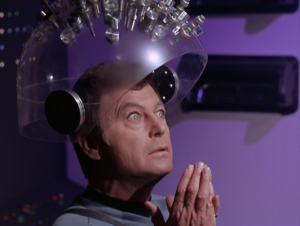
Apparently the answer is “the computer gave her a temporary upgrade,” but the knowledge only lasts for three hours.
No, that’s not how brains work either, I know. But on the upside, this episode solves the question of “how are we going to get a major cast member into every scene of this episode if his brain has been literally removed from his head?”
I AM SO GLAD YOU ASKED.
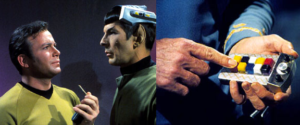
This episode is fundamentally bananas, but let’s all sit back and appreciate the solid brass balls of the writer who first had this idea, then spoke it aloud in front of other professional adults, and then managed to convince them to use it. Hats off, unknown writer.
Podcast: Play in new window | Download | Embed
Subscribe: Apple Podcasts | Email | RSS
Ari
November 9, 2016
Episode 55 – TOS 2×26: “Assignment: Earth”
In the Original Series season 2 finale, we find ourselves, inexplicably, in 1968. Inexplicably because it contradicts everything we’ve been told before or since about messing with timelines and the dangers of time travel. And why? Nominally, to do “historical research” into the “pivotal events” of 1968. Actually? To shoehorn a back door pilot into what might have been the last episode of TOS.
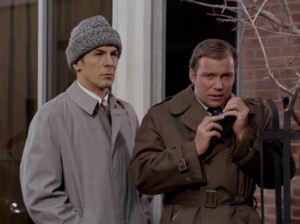
Assignment: Earth was, unsurprisingly, a Gene Roddenberry concept for a show that, equally unsurprisingly, did not get picked up. The premise is basically that generations ago, a secret, distant alien race took humans from Earth (whether this was done forcibly or the humans came willingly is never made clear) to educate and train them with the end goal of interfering in key points of Earth events.
Now, I can hear at least one of the questions forming in your mind, i.e. But To What End? Do these secret, distant, omnipotent (they can beam between star systems, which is how guest star Gary Seven and his sidekick Isis, A Cat, Yes, Literally A Cat, end up on board the Enterprise to kick off the story) aliens have prescient knowledge of Earth’s future? A semi-magical knowledge of causality? Are they, themselves, time travelers? And are they trying to save Earth, or interfere with its development so that the Federation never happens??
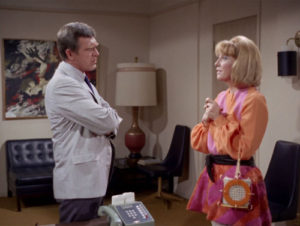
Well, we never know, because the episode is so taken with its own cleverness and goofy moments and under-using the amazing and charismatic other guest star, Teri Garr, to actually give us enough information about Gary’s assignment or his employers to form an idea of their intentions. Gary Seven also falls pretty short of likable, to the point that we get a twenty-second scene of him standing at a window sneering down at “primitive” New York City and wishing he could return to the Secret Planet ASAP.
1968 in the Trek ‘verse was apparently so tumultuous that Spock has trouble narrowing down which disaster Seven is here to avert, but they eventually settle on an SDI-type nuclear platform launch which sends Earth down a bad road. Gary Seven refers to it as “starting World War 3,” which, since we know that in the Trek timeline WW3 happens anyway, you have to wonder what the hell Gary and Friends were doing in the 80s and 90s?
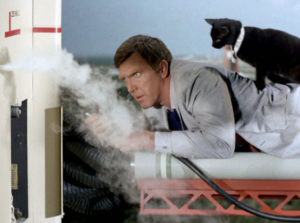
The real shame about this episode is that at no point did we care about the wacky hijinks of time cop Gary Seven meeting the obstacle of the well-meaning Enterprise crew as much as we were demanding explanations of what the hell his bosses were up to and why they were up to it. But Assignment: Earth was never to be, and TOS got one more season, so we’ll never know.
Podcast: Play in new window | Download | Embed
Subscribe: Apple Podcasts | Email | RSS
Ari
November 2, 2016
Episode 54 – TOS 2×25: “Bread and Circuses”
Apparently no one at 1960s Desilu was listening to me, because this week’s episode involves yet another goddamn parallel Earth.
And not just Earth: an Earth where the Roman Empire survived until the 20th century, and yet somehow still ended up speaking colloquial North American English.
Save me.
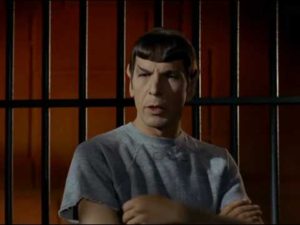
We open to another missing Federation ship, though this time it’s the Merchant Service S.S. Beagle, captained by another old friend of Kirk’s, an R.M. Merik. Yeah, we said the same thing: it’s never a good sign when they meet up with an old friend of Kirk’s. They’re always dead or evil or evil and then dead. Guess what? You’re all psychic.
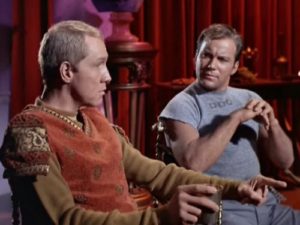
Turns out that Captain Merik, who once flunked out of the Academy for failing some psych test – we assume he answered “yes” to the question “have you ever really really wanted to be a Roman Emperor?” – is now sitting pretty as First Citizen of the somehow-English-speaking Space Roman Empire, and also, basically his entire crew has been murdered in the arena. Merik’s leash – and his privileged position – is firmly in the hands and at the whim of the Space Rome Pro-Consul, who is convinced that because he got his hands on Merik and Merik’s crew, he can easily do the same with Kirk by way of threats and/or bribery.
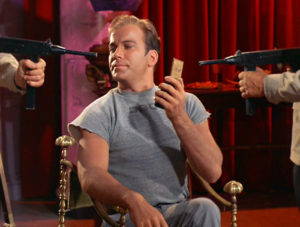
In the end, to literally no one’s surprise, Merik ends up stabbed by the Space Pro-Consul in the midst of helping Kirk & Co escape. And the English thing? Is all in service of a pun. And guys, I can appreciate a good pun, honestly I can. But in this case I’m going full John-Oliver-on-the-Bugle STOP IT NOW because it turns out that the Children of the Sun are actually the Children of the Son. As in: the son of God.
Yes. Space Rome, PLUS Space Christianity, PLUS fundamental misunderstanding of the history of Christianity in the Roman Empire.
This episode is fired. See you next week.
Podcast: Play in new window | Download | Embed
Subscribe: Apple Podcasts | Email | RSS
Ari
October 26, 2016
Episode 53 – TOS 2×24: “The Ultimate Computer”
Now, I’m sure this will come as no surprise to you, the habitual sci-fi consumer, but here’s a pro tip: when you give a New, Amazing, Cutting Edge Computer the sole charge of a starship/town/space station, Shit Goes Down.
In this episode, Dr. Richard Daystrom (who later gave his name to The Daystrom Institute, one of the Federation’s premiere scientific institutes of research and learning) is here to field-test his shiny new M5 computer, a device designed to take over the running of a starship in order to make a human crew redundant. Dr. Daystrom, as it happens, is, uh, a liiiiittle too emotionally involved with his Ultimate Computer.
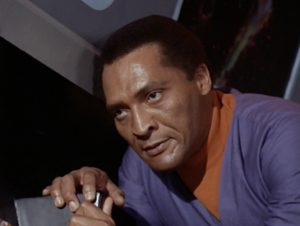
Now, a nearly infinite number of questions might immediately spring to mind, but we think the principle ones are:
- why?
- wouldn’t that make the entire mission of Starfleet redundant?
- haven’t any of the top brass who approved this field test ever seen a sci-fi movie?
- moreover, why??
Also, naturally, the moment Daystrom comes on board he just can’t shut up about how pointless human crews and, more importantly, human Captains are, and how the future is all about super-genius computers doing the work of all these folks who have dedicated their lives to, uh, you know, running a starship, and making them obsolete. He’s getting a mystifying amount of support from Starfleet brass, even from Kirk’s so-called “old friend” Commodore Wesley, who after the M5’s first successful outing goes so far as to address Kirk as “Captain Dunsel,” which is Starfleet Academy-ese for “you serve no purpose.”
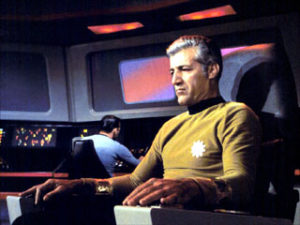
Burrrrrrn.
Obviously, obviously, the M5 goes a little spare, takes over the entire ship, and – oops! – murders upwards of three dozen crew on the other ships involved in the field test. Even in tech support we couldn’t label that as “expected behaviour.” It comes out that the M5 isn’t actually a pure AI, but an “imprint” of Daystrom’s own brain, and it would appear that the hybridization isn’t exactly… what’s the word? Oh yes: stable.
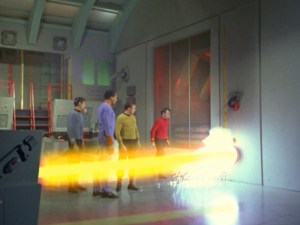
Honestly, we think, as always, that the #1 qualification for admittance to Starfleet Academy is genre savvy, e.g. maybe a quick skim of 2001: A Space Odyssey.
On the plus side, it appears that “once built a pseudo-computer that went rogue and murdered dozens of Starfleet personnel” is not a disqualifying CV item when it comes to getting vast, prestigious research facilities named after you, so there’s that. In the Federation, anyone really can be anything.
Podcast: Play in new window | Download | Embed
Subscribe: Apple Podcasts | Email | RSS
Ari
October 19, 2016
Episode 52 – TOS 2×23: “The Omega Glory”

Okay, here’s a partial list of acceptable scenarios under which you may portray generally Earth, or specifically the United States of America, as existing on an alien planet or anywhere that is not our universe:
- alternate timelines
- alternate universes
- cultures that deliberately imitate Earth
- cultures that have been plucked from Earth/America and plonked down on another planet and directed to develop that way
- cultures that have been plucked from Earth/America and deliberately preserved, in situ, by omnipotent alien museum curators
- alien training programs that mimic and live as humans for the purposes of infiltration/invasion
Scenarios where this just pisses us off:
- alien planets thousands of light-years from Earth spontaneously developing parallel China and America, right down to the Stars & Stripes, the Christian Bible and the Declaration of Independence for the purposes of making a sloppy point about how The Cold War Is Bad And We Should Stop, with bonus White Indians, yes you read that right
Guess which one happens in this episode.
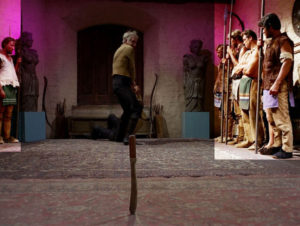
The frustrating thing is that this episode contains at least three barely-connected episodes, and 1.75 of them could be good stories. Unfortunately, they’re made retroactively irrelevant by the general shittiness of the final, out-of-the-blue, America, Fuck Yeah! minutes of the episode, especially since the entire debacle could have been avoided by a refresher course on Biohazard Protocols (yes, we’re back here, again) and Keeping In Touch With Starfleet.
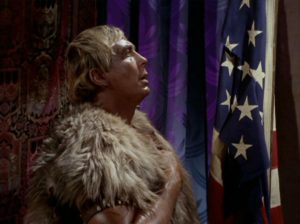
Mystifyingly, this was one of Gene Roddenberry’s submissions for the original pilot, but NBC – rightly – made him shelve it until late in the second season when, presumably, they could no longer stop him.
Possibly this episode would seem less wretched to an actual American, but we seriously doubt it.
Podcast: Play in new window | Download | Embed
Subscribe: Apple Podcasts | Email | RSS
Ari
October 12, 2016
Episode 51 – TOS 2×22: “By Any Other Name”
So with guest-host Trisha joining us this week, the NSMTNZ crew is 50/50 on loving this episode and finding the Kelvins some of most genuinely scary villains of TOS so far.
The story begins rather generically, with the Enterprise responding to a distress call… and then being immediately taken prisoner. “Thanks for picking up the phone,” says Chief Villain Rojan. “You, your ship, and your crew are now ours to command.”
“…huh,” says Captain Kirk.
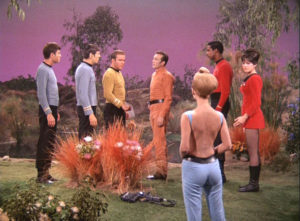
The thing about this story is that you expect it to go down just like every other episode: our brave crew, taken prisoner by seemingly all-powerful aliens, notices a flaw at the outset, makes a plan to exploit that flaw, and ultimately defeats said all-powerful aliens. And ultimately, that’s what happens. Intellectually, as viewers, we know that ultimately, the Enterprise crew will triumph. But the difference in this episode is, chiefly, two-fold.
First: the episode defies your assumption that the crew will progressively one-up the aggressors by having the Kelvins repeatedly, ruthlessly, foil our protagonists’ attempts at rebellion, starting with a calculated, cold-blooded murder in the first five minutes of the episode. This murder is not only utterly cold-blooded, but deliberately calculated for the purposes of breaking Kirk, and making him less likely to take risks later on in the episode.
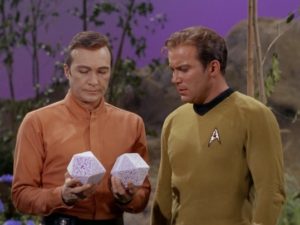
And the crazy thing? It works. Former-space-squid Rojan reads Kirk like a book in the first forty seconds of their acquaintance and works out exactly what will keep Kirk in line when faced with the deaths of more of his crew, to the point of making Kirk decide against initiating a self-destruct that will protect the Federation and the entire Milky Way Galaxy.
Second: the crew gives up. Not for long, admittedly; the time between “oh, we’re fucked” and “oh hey, a plan!” is a matter of seconds, in-episode. But it happens, and the Eureka moment that gives them the idea for their plan is essentially an accident: their enemy makes a mistake. But if that hadn’t happened? Damn. Who knows?
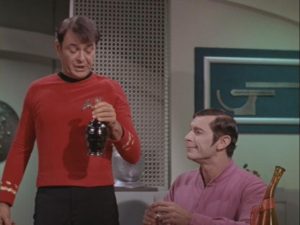
It’s a rare episode of Trek that can convince us, even for a fraction of a second, that maybe this time, just maybe, the good guys might not win the day. And even though the solution to the problem descends into Wacky Hijinks – tricking the Kelvins into giving in to the unexpected barrage of inconvenient urges that come hand-in-hand with stuffing an ultra-rational space-squid into a tiny human body via booze, makeouts and fisticuffs – that qualifies it, IMHO, for entry into the Surprisingly Good Episodes Hall of Fame.
Podcast: Play in new window | Download | Embed
Subscribe: Apple Podcasts | Email | RSS
Ari
October 5, 2016
Episode 50 – TOS 2×21: “Patterns of Force”
Good news: this is our 50th Episode! Holy crap!
Bad news: Long story short, the official subtitle for this episode is “Nazis‽”
If you’re confused: that’s an interrobang, one of the most graceful forms of punctuation in the English language. No other symbol so effectively encompasses our feelings about this episode.
Because that’s right, kids. We’re there. Nazis in space.
Literal Nazis.
In space.
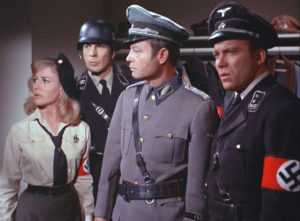
You’ve probably heard of this episode even if you haven’t seen it. Most sci-fi does metaphorical Nazis. Allegorical Nazis. (Uncomfortably topical Nazis, especially today, especially if you spend thirty seconds taking in American campaign coverage.)
Only Trek took one look at the tradition of putting our failings as a society into sharp relief by making clever and subtle references to one of the greatest horrors ever perpetuated by a human country and went “subtle? hah! SUBTLE IS FOR CHUMPS.” And then raided the Desilu costume store for every piece of World War 2 regalia they could lay their hands on, plus all the genuine Third Reich footage they could scrounge up. The least-subtle cherry on top? The downtrodden class of Planet Space Nazi are called Zeons, most of whom have spaceified Hebrew names. Imagine the word “subtlety” painted big and bright on one of those paper circles the mascot bursts through during a high school pep rally and you’re close to the levels we’re talking about.
The central plot of this episode: a famous and respected Federation historian tries to usher a chaotic and war-like alien world into the harmony of a united society by… replicating the Third Reich, with the argument that it was the “most efficient” state in Earth history.
Yes. These are words spoken on actual television, a mere twenty years after the end of World War 2. Imagine that.
Supposedly the historian in question intended to use a defanged version of Naziism, sans runaway bigotry and mass murder, but Something Went Wrong, that something in question being One Bad Guy who… ruined the Benign Nazi Revolution for everyone? I guess?
Obviously there are endless arguments to the contrary, e.g. There Is No Such Thing As Benign Nazis, most of which apparently fell on deaf ears in the room full of mostly-white, mostly-Christian, mostly-male Trek writers and producers, but perhaps the most bizarre choice made by the folks in charge was writing an episode like this and then sending two of the original series’ cast’s three Jewish actors down to impersonate and later get beaten up by space Nazis. It was an… interesting choice, to be sure.

All things considered, There Is No Such Thing As Benign Nazis is probably the best lesson we can draw from this episode, especially given the chilling similarities between in-episode nonsense rhetoric and the so-called debate we watched last week. It’s something that was obviously on the writers’ minds, and maybe something that should always be on everyone’s: that we’d damn well better learn from our history; otherwise, some day, someone might decide to hit replay on us.
Podcast: Play in new window | Download | Embed
Subscribe: Apple Podcasts | Email | RSS
Ari
September 28, 2016
Episode 49 – TOS 2×20: “Return to Tomorrow”
So in case you were still on the fence about this, here is the lesson for this episode: never, ever, ever let a semi-ascended super-being, especially one who considers you a child or ant by comparison to themselves, inhabit your body, even temporarily.
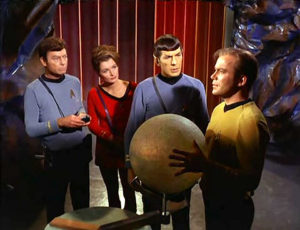
Like, how are we even still having this conversation? How? How has at least a year charting the vast reaches of unknown space not taught anyone on this ship even an iota of genre-savvy? I’ve known this since I learned to read. Anyone with a post on board the Enterprise is, by definition, much smarter than me, so how do they not know this? How does anyone in Starfleet not immediately go “oh, this is a terrible idea for about thirty-seven reasons to start with, no matter how scientifically fascinating it is?”
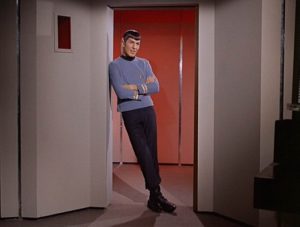
Because that’s what happens in this episode: three apparently intelligent, sciencey adults consent (and oh, boy, are there ever some consent issues on the table here: Mulhall and Kirk’s tenants last about three seconds in their new bodies before commencing makeouts) to have the consciousnesses of three “dead” aliens from an extinct race “borrow” their bodies while they build themselves new android ones.
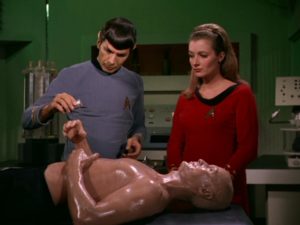
That this will immediately go horribly wrong should be a foregone conclusion, but Kirk sways the room with his famous “risk is our business!” speech, and apparently to Kirk, Spock, and Dr. Anne Mulhall (played by Diana Muldaur, who would later play Dr. Katherine Pulaski on Next Gen), this is just too cool an opportunity to pass up. Clearly we have different priorities. Fine.
I just remembered that once, an actual human physicist stuck his head into a particle accelerator just to see what would happen. And there wasn’t even the knowledge of the infinite at stake. Nothing should surprise me anymore.
Podcast: Play in new window | Download | Embed
Subscribe: Apple Podcasts | Email | RSS
Ari
September 21, 2016
Episode 48 – TOS 2×19: “A Private Little War”
Pro tip #1: guns are bad.
Pro tip #2: the Non-Intereference Directive is there for a fucking reason.
So this episode? Was actually sort of well-delivered? In a way? I mean, if you ignore that it was originally supposed to be a Vietnam metaphor and actually ended up being about disarmament and mutually assured destruction and how there often is no “good” answer to a conflict so much as there is the possibility of balance.
Also on this planet: random space yeti called Mugato. The gift that keeps on giving.
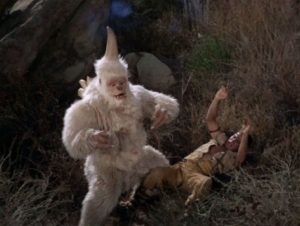
Ostensibly, the Enterprise is on the planet of the week to follow up on Kirk’s 12-year-ago survey which declared the planet to be, basically, lousy with medicinal herbs, and home to two cultures: the Hill People, AKA: Definitely Not A Native American Stereotype, and the Villagers. Both are discussed in ultra-naive infantilizing Deep Green Ecology terms, and supposedly live in harmony with nature and each other
During his first visit, Kirk also made friends with one of the two indigenous cultures through the Hill People’s new leader, Tyree. Apparently this planet has no conflict and no weapons, though a secondary purpose for the visit is to make sure the Klingons aren’t violating their treaty with the Federation by interfering with the natives’ cultural development.
Guess what happens. Yeah, you guessed it: the dark-haired Villagers have been getting weapons upgrades from those jerks the Klingons, who helped them fast-forward their weapons technology 1,200 years from bows and arrows to flintlock projectile weapons, not to mention playing the snake to the Villagers’ Adam. Apparently merely suggesting that war and killing might be super-fun was enough to turn the once-peaceful Villagers into landed Saxon raiders, and they’re frankly slaughtering the Hill People.
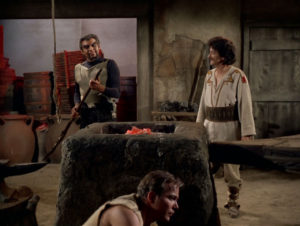
Setting aside the (pretty gross) Temptress/Eve treatment Tyree’s witch-wife, Nona, gets, this is a rare episode where the biblical analogy is pretty well carried-out, if you substitute “gun” for “apple,” but it (perhaps wisely) doesn’t attempt to give a definitive answer to the question it poses. It’s all very well to talk about throwing away our gatling guns and our nuclear bombs – a noble goal, certainly – but the knowledge of how to build more is out there, and it is, despite the hardcore cliche status of this phrase, very hard to kill an idea. So what do you do?
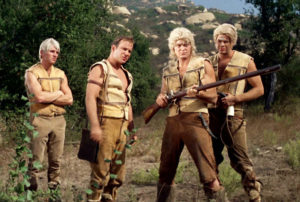
According to James Kirk, the provisional answer is “I don’t know, but it’s probably better if more than one guy has the bomb.”
Podcast: Play in new window | Download | Embed
Subscribe: Apple Podcasts | Email | RSS
